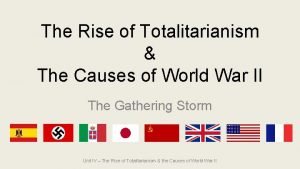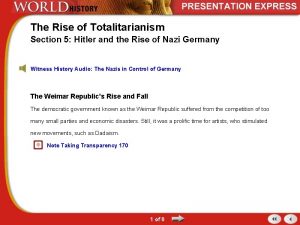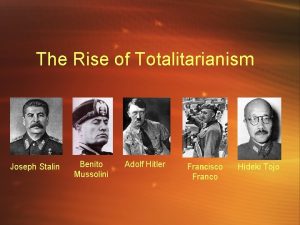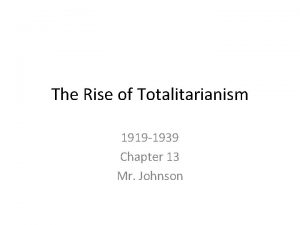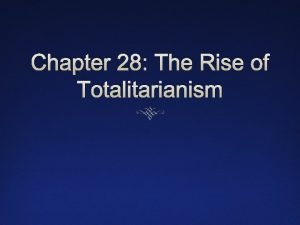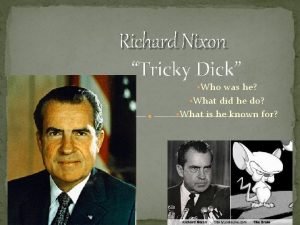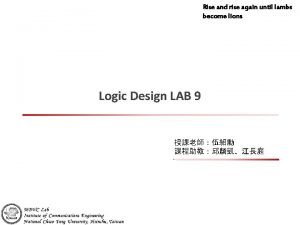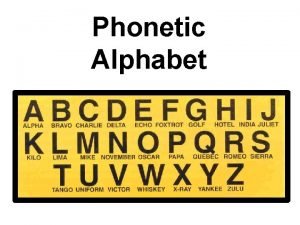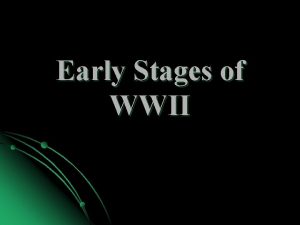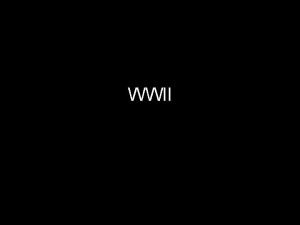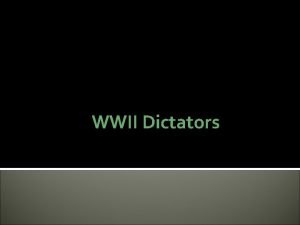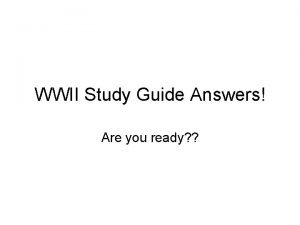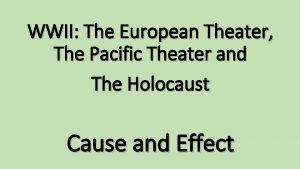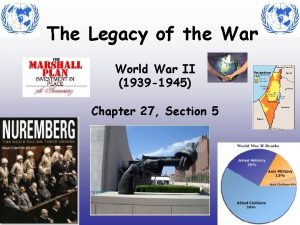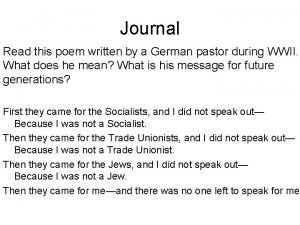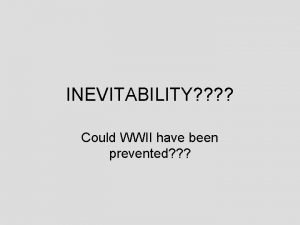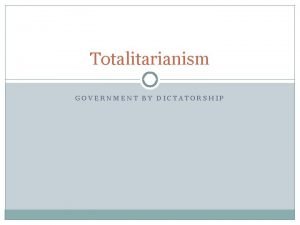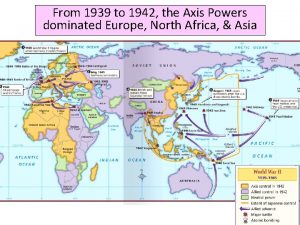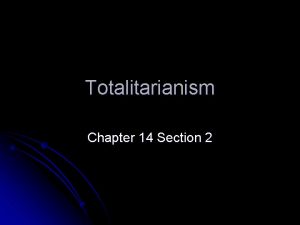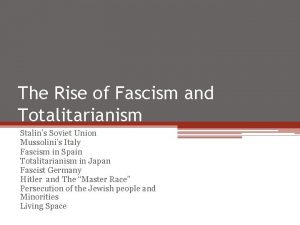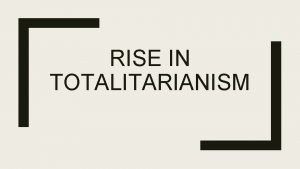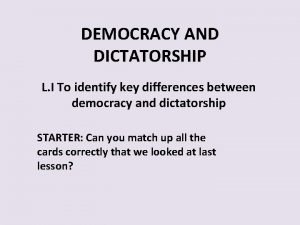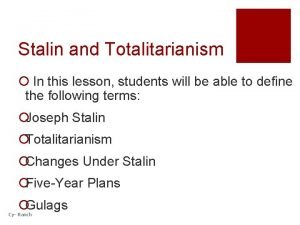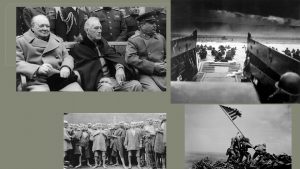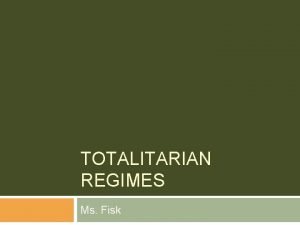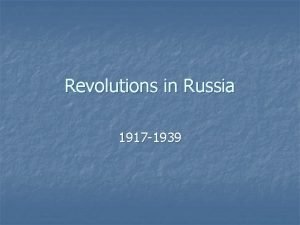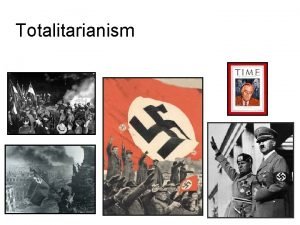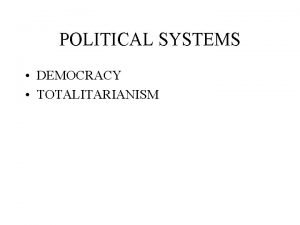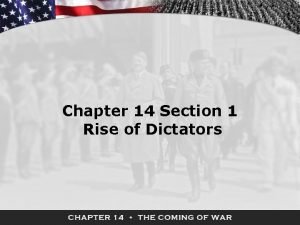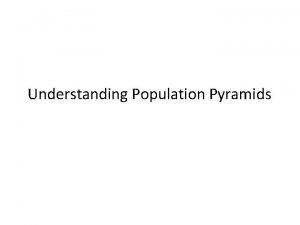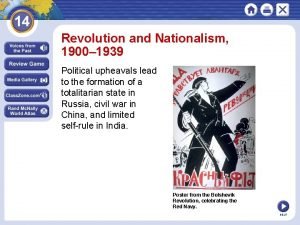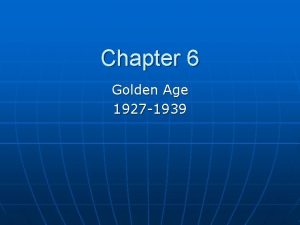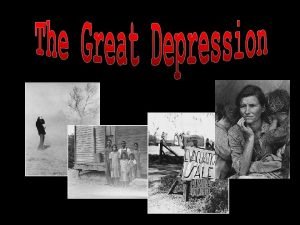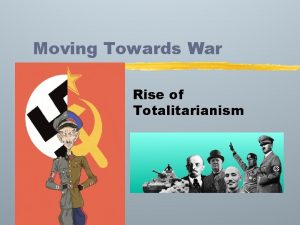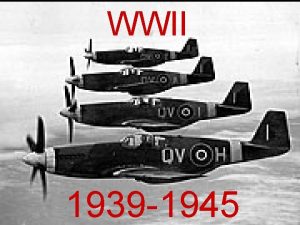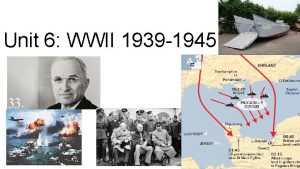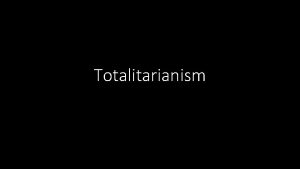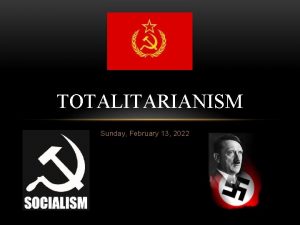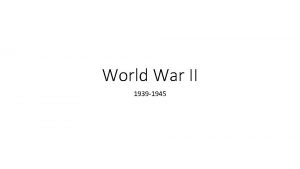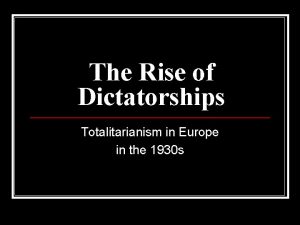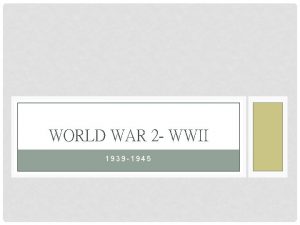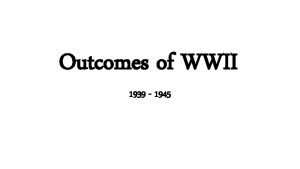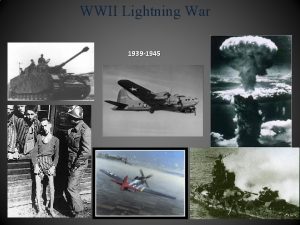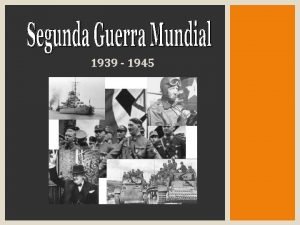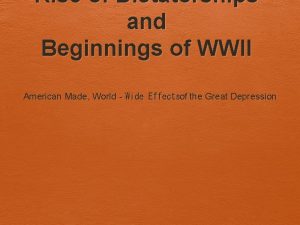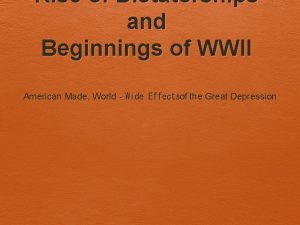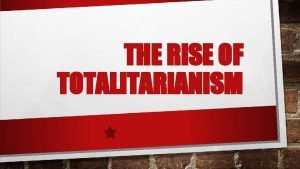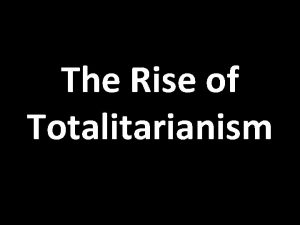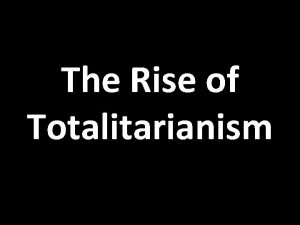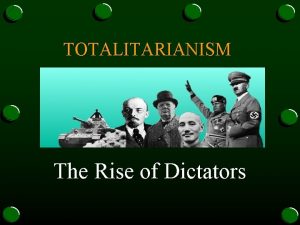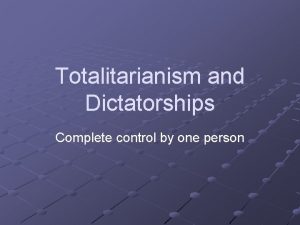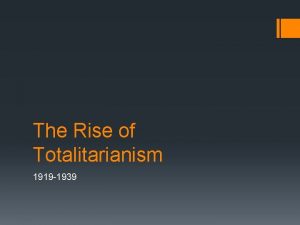Rise of Dictatorships Totalitarianism and WWII 1939 1945
















































- Slides: 48

Rise of Dictatorships Totalitarianism and WWII 1939 -1945

U. S. Following WWI n n Prosperity (on the surface) n Consumer spending, new products n Buying on credit (buy now, pay later) n Strong stock market n The Roaring Twenties Reality n Buying stocks with credit (on margin) n Overproduction of goods – prices fell n Farmers struggling – couldn’t get high prices n Stock Market Crash! October 29, 1929 n THE GREAT DEPRESSION

Post War Uncertainty n n n Unstable democracies, lots of political parties and coalitions; war debts Socialist/Communist groups strengthen – view capitalism as a failure (Depression) Germany – Weimar Republic (unpopular) n n n No democratic history in Germany Inflation – value of mark declines dramatically U. S. loans money to Germany

Rise of Dictatorships n n n n Worldwide depression Millions lose faith in democratic systems Turn to totalitarian leaders: Mussolini – Italy Hitler – Germany Franco – Spain Stalin – USSR Hirohito/Tojo - Japan


Italy n Benito Mussolini – Fascist Party - 1923 n n n Il Duce – The Leader Blackshirts – private army; terrorized people Extreme nationalism – vowed to revive the glory of the Roman Empire Popularity increases as economy worsens 1922 King Victor Emmanuel “steps down”

Germany n Adolf Hitler – Nazi Party n Der Fuhrer – The Leader n Beer Hall Putsch 1923 – attempts to take over govt. n In jail, writes Mein Kampf (My Struggle) n Brown Shirts (SA – Storm Troopers), Gestapo (SS) (Heinrich Himmler) n Chancellor in 1933 – Hindenburg “steps down” n Terror and intimidation; propaganda (Joseph Goebbels), Hitler youth, education, media n The Third Reich

Germany cont. n n Aryans were the “master race” Germany needed lebensraum (living space) Totalitarian state Anti-Semitism – against Jews

USSR & Japan n n Joseph Stalin (Man of Steel) Control over industry, farms Millions die under forced labor, collective farms, prisons Japan – Emperor Hirohito Heideki Tojo – military leader takes control

Spain n n Fascist leader Francisco Franco (Nationalists) revolts against government Hitler and Mussolini send troops Hitler tests new weapons on Spain Franco becomes dictator – remains neutral in the war

Axis Aggression - Japan n n Japan desperately needed raw materials Seizes Manchuria 1931 Invades China 1937 Wants to expand in the Pacific

Axis Aggression - Italy n n Mussolini wants a colonial empire Invades Ethiopia 1935 Later Albania, Libya League of Nations does nothing

Axis Aggression - Germany n n n 1. 1936 - German troops occupy the Rhineland 2. 1938 – Germany annexes Austria – Anschluss 3. Sudetenland (Czechoslovakia) n n Germany needs lebensraum Munich 1938 – appeasement Neville Chamberlain (British Prime Minister) gives in 4. Germany takes rest of Czech. 6 months later

Europe Goes to War n 5. Germany signs non-aggression pact (Nazi-Soviet Pact) with USSR 1939 n n Stalin + Hitler Agree to divide Poland 6. Sept. 1, 1939 – Germany invades Poland WWII begins

Europe Goes to War n Blitzkrieg (“lightening war”) n n Hitler crushes Poland Stalin takes half of Poland for USSR (communist) French build up Maginot Line - defenses April 9, 1940 – Denmark, Norway, Netherlands, Belgium fall n n Takes Paris on June 14, 1940 Evacuation (“Miracle”) at Dunkirk to England

War cont. n Battle of Britain n n Luftwaffe vs. Royal Air Force (RAF) Great acts of individual bravery June 1940 – June 1941 – 30, 000 Londoners killed Winston Churchill rallies England Hitler’s first defeat



Americans Debate n n Was WWI a mistake? Was it about big industries making money off war? Isolationists debate the interventionists Neutrality Act 1939 n n Cash & carry – nations could buy from U. S. if they paid cash & used own ships (pro ally) Lend Lease Act - loans to allies Atlantic Charter – deepening alliance w/Britain; self determination of nations Hitler orders attacks on U. S. ships

n Japan Builds an Empire n n American Response n n n Invades Manchuria; other Pacific Islands 30’s & 40’s FDR moves Pacific fleet to Pearl Harbor, Hawaii Threatens Japan’s expansion America remains neutral Embargo (oil); Japanese assets frozen Japan Attacks Pearl Harbor n n December 7, 1941 – “a date which will live in infamy” U. S. enters World War II

Pearl Harbor




Fighting in Italy and North Africa n n German General Erwin Rommel – “Desert Fox” Leads Afrika Corps Panzer units (tanks) Defeated by GB at Battle of El Alamein (Bernard Montgomery – GB) n n n George Patton takes Sicily; North Africa Italy surrenders Mussolini killed by anti -fascists


War in the Soviet Union n n n 3. 6 million Germans attack in 1941 Operation Barbarossa Scorched earth policy Bitter winter Battle of Stalingrad Red Army launches massive assault; victory for USSR Turning point in war

What is this?


Invasion of Western Europe n n n Build up of troops in GB D-Day (June 6, 1944) n Operation Overlord n Largest landing force in history invades Normandy, France n Dwight D. Eisenhower – Supreme Allied Commander Battle of the Bulge n 1944 – Hitler’s last chance to defend Germany n Costly for U. S. n Patton stops Germans


War Ends in Europe n The Soviets Advance n Move on Berlin n n U. S. moves from west Soviets move from east Soviets take Berlin in April 1945 Germany Surrenders n n n Hitler commits suicide on May 1, 1945 Germany surrenders on May 8, 1945 V-E Day (Victory in Europe Day)



War Ends in Europe cont. n The Yalta Conference n n n Stalin, Churchill, and FDR (the big three) make postwar plans Divide Germany into 4 zones Stalin promised to join war against Japan Also to hold free elections Potsdam Conference n Truman told Stalin about a nuclear weapon

War in the Pacific n n n n The Japanese advance The Philippines fall General Macarthur forced to leave (“I shall return”) Bataan Death March The Battle of Coral Sea First aircraft carrier battle Prevented attack of Australia



War in the Pacific n n Allied victories turn the tide The Battle of Midway n n Iwo Jima and Okinawa n n n Destroy 4 Jap. ships Key victories Kamikaze fighters Island hopping to Japan

War Ends in Pacific n n n The Manhattan Project – secret project to develop an atomic bomb (J. Robert Oppenheimer) Los Alamos – test site FDR dies – Truman makes decision to drop the bomb August 6, 1945 - “Little Boy” dropped on Hiroshima August 9, 1945 - “Fat Man” dropped on Nagasaki Sept. 2, 1945 – Japan signs surrender


Hiroshima

Japanese Internment Camps Japanese Americans put into camps Fear of spying


Liberation n n Soviet and American troops come upon Nazi concentration camps World begins to learn about the Holocaust Genocide “Final Solution”


Europe and Japan in Ruins n n n Over 50 million Europeans dead, 2/3 of them civilians Physical destruction of land cities Refugees, displaced persons, search for Holocaust survivors Nuremberg Trials – 22 charged with war crimes, only one expressed remorse Occupation of Japan (Mac. Arthur) n n Demilitarization Democratization

Losses – Includes civilians n n n n n USSR – 25, 000 (17, 000 civilians!) Germany – 7, 000 (10, 000 civilians) Poland – 6, 800, 000 China – 11, 300, 000 Japan – 1, 800, 000 France – 810, 000 Great Britain – 388, 000 Italy – 410, 000 U. S. – 295, 000
 Totalitarianism
Totalitarianism The rise of totalitarianism section 5 quiz
The rise of totalitarianism section 5 quiz Authoritarianism vs totalitarianism
Authoritarianism vs totalitarianism Chapter 13 the rise of totalitarianism
Chapter 13 the rise of totalitarianism Chapter 28 section 3 fascism in italy
Chapter 28 section 3 fascism in italy Tricky dicky richard nixon
Tricky dicky richard nixon Rise and rise again
Rise and rise again Little lambs academy
Little lambs academy Rise and rise again until lambs become lions origin
Rise and rise again until lambs become lions origin Pah!
Pah! Advances in technology during wwii
Advances in technology during wwii What was the nye committee
What was the nye committee Wwii picture
Wwii picture Wwii picture
Wwii picture Ww2 study guide answer key
Ww2 study guide answer key Effect
Effect 1950s television history
1950s television history Wwii
Wwii Causes of ww2
Causes of ww2 Germany map
Germany map Wwii
Wwii Could wwii have been prevented
Could wwii have been prevented Wwii test review
Wwii test review Ww2 apush dbq
Ww2 apush dbq Pros of dictatorship
Pros of dictatorship Who dominated europe, north africa and asia from 1939-1942?
Who dominated europe, north africa and asia from 1939-1942? Chapter 14 section 2 totalitarianism
Chapter 14 section 2 totalitarianism Fascism vs totalitarianism
Fascism vs totalitarianism Onjectives
Onjectives Democracy vs dictatorship venn diagram
Democracy vs dictatorship venn diagram Pictoword for democracy
Pictoword for democracy Fascism vs totalitarianism
Fascism vs totalitarianism Totalitarianism lesson plan
Totalitarianism lesson plan Holocaust bell ringers
Holocaust bell ringers Traits of totalitarianism
Traits of totalitarianism Russian totalitarianism
Russian totalitarianism Totalitarianism
Totalitarianism Secular totalitarianism
Secular totalitarianism Chapter 14 section 2 totalitarianism
Chapter 14 section 2 totalitarianism Dubai population pyramid
Dubai population pyramid Fashion 1930 to 1940
Fashion 1930 to 1940 Revolutionary leaders 1900-1939
Revolutionary leaders 1900-1939 Poland population 1939
Poland population 1939 Shingelfrisyren
Shingelfrisyren The golden age (1939-1956)
The golden age (1939-1956) Harta germaniei naziste
Harta germaniei naziste Golden age of aviation 1927-1939
Golden age of aviation 1927-1939 1939 market crash
1939 market crash Mapamundi 1939
Mapamundi 1939
